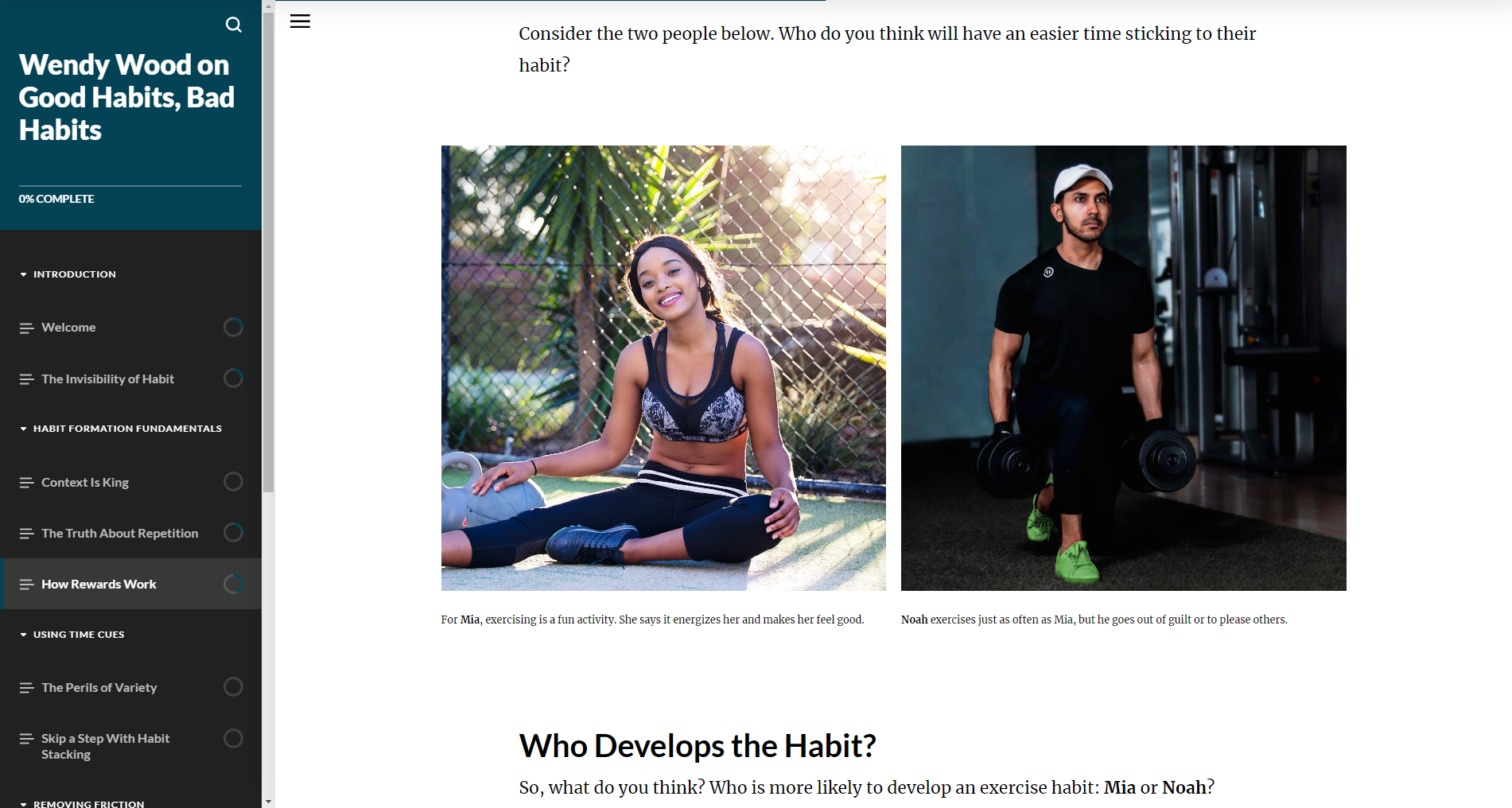
After completing this course you will be able to:
- Understand the scientific analysis of habit formation.
- Identify the three bases for habit formation: context, repetition, and reward.
- Develop a toolkit for breaking unwanted habits and fostering desired ones.
- Automate behaviors to create lasting positive changes.
- Recognize the role of context in facilitating or hindering habits.
- Apply strategies to make habit formation easier through environmental adjustments.
- Acknowledge and leverage the power of repetition in forming new habits.
- Utilize rewards effectively to sustain new habits.
About This Course
Embark on a transformative journey with Wendy Wood, a preeminent scientist on habits, as she unravels the intricacies of our daily routines in “Good Habits, Bad Habits: The Science of Making Positive Changes That Stick.” This course is not just an exploration—it’s a roadmap to rewiring your life. Through engaging lessons, you’ll dissect the anatomy of habits, from their unconscious triggers to the rewards that sustain them. Discover how to harness the power of context and repetition to forge new, empowering habits, and how to dismantle the ones that hold you back. With Wood’s expert guidance, you’ll learn to navigate the landscape of your own behaviors and emerge with the tools to shape a more intentional, fulfilling life.
What You Will Uncover, Discover, and Learn
- Individuals seeking to make positive changes in their personal or professional lives.
- Those who have struggled with breaking old habits and want to understand why.
- Anyone interested in the science behind behavior and self-improvement.
- Lifelong learners and self-help enthusiasts eager to apply scientific insights to their daily lives.
- Professionals aiming to enhance their productivity and efficiency through better habits.








Course Content
Course Syllabus
- 12 Videos: 33 minutes
- Estimated Course Time: 2 Hours
| INTRODUCTION |
| 1. Welcome |
| 2. The Invisibility of Habit |
| HABIT FORMATION FUNDAMENTALS |
| 3. Context Is King |
| 4. The Truth About Repetition |
| 5. How Rewards Work |
| USING TIME CUES |
| 6. The Perils of Variety |
| 7. Skip a Step With Habit Stacking |
| REMOVING FRICTION |
| 8. The Surprising Power of Situational Control |
| 9. What French Cooking Can Teach You About Habits |
| DRIVING BEHAVIOR |
| 10. Self-Control Isn’t What It Looks Like |
| 11. Happiness and the Mindfulness Habit |
| SUMMARY |
| 12. Conclusion |
Additional Courses…
#ld-cg-looeg0w7au .grid{grid-template-columns:repeat(3,minmax(0,1fr));} #ld-cg-looeg0w7au .grid > .item > .post, #ld-cg-looeg0w7au .grid > .item .content{display:flex;flex-direction:column;height:100%;} #ld-cg-looeg0w7au .grid > .item .content > *:last-child{margin-top:auto;} #ld-cg-looeg0w7au .grid > .item .content .entry-title, #ld-cg-looeg0w7au .grid > .item .content .entry-title *{font-size:18px;} #ld-cg-looeg0w7au .grid > .item .content .entry-title{} #ld-cg-looeg0w7au .grid > .item .content .entry-title *{} #ld-cg-looeg0w7au .grid > .item .content .entry-content{} #ld-cg-looeg0w7au .grid > .item .content .entry-content *{} #ld-cg-looeg0w7au .grid > .item .ribbon{} #ld-cg-looeg0w7au .grid > .item .ribbon, #ld-cg-looeg0w7au .grid > .item .ribbon *{} #ld-cg-looeg0w7au .grid > .item .icon{} #ld-cg-looeg0w7au .grid > .item .icon, #ld-cg-looeg0w7au .grid > .item .icon *{} #ld-cg-looeg0w7au .grid > .item .button, #ld-cg-looeg0w7au .grid > .item .button *{} #ld-cg-looeg0w7au .grid > .item .button, #ld-cg-looeg0w7au .grid > .item .button *{}










